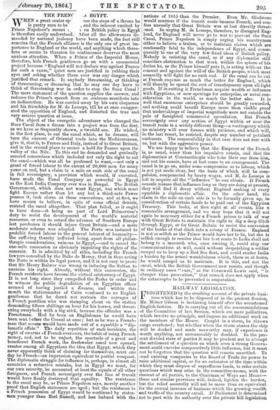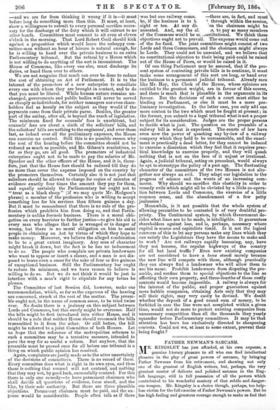RAILWAY LEGISLATION. F RIGHTENED by the crushing amount of the private
busi- ness which has to be disposed of in the present Session, Mr. Milner Gibson is bestirring himself after the accustomed English fashion. He is carrying out all the recommendations of the Committee of last Session, which are mere palliatives, which involve no principle, and impose no additional work on the members of the House. Caught in a storm, he throws cargo overboard ; but whether when the storm abates the ship will be docked and made seaworthy may, if experience is worth anything, not unreasonably be doubted. In the pre- sent divided state of parties it may be prudent not to attempt the settlement of a question on which even a strong Govern- ment could exercise comparatively little influence, but it must not be forgotten that the question will remain unsettled. To send existing companies to the Board of Trade for power to raise additional capital, or for an extension of the time within which they must dispose of superfluous hinds, to refer certain questions which may arise in the committee-rooms, with the consent of all parties, to the Chairman of Ways and Means— these and similar provsions will, indeed, lighten the burden, but the relief assuredly will not be more than an equivalent for the annual increase of business which the growing wealth and traffic of the country entail. If Parliament is determined not to part with its authority over the private bill legislation
—and we are far from thinking it wrong if it is—it must before long do something more than this. It must, at least, show a willingness to submit to every personal sacrifice neces- sary for the discharge of the duty which it will entrust to no other hands. Committees must consent to sit even at eleven o'clock in the morning. That Lord Robert Cecil should kick against a proposition which would leave the unhappy com- mittee-man without an hour of leisure is natural enough, for he is willing to hand over the private business to an extra Parliamentary tribunal. But the refusal by a House which is not willing to do anything of the sort is inconsistent. The House of Commons, like every one else, must discharge its duties, or hand them over to others.
We are not sanguine that much can ever be done to reduce the cost of obtaining an Act of Parliament. It is to the interest of the promoters of a new enterprise to conciliate every one with whom they are brought in contact, and to do that you must be liberal. While human nature remains un- changed, governments and public bodies will never be served as cheaply as individuals, for neither managers nor even share- holders feel as keenly on the subject as they would if the payments came from their private purse. Besides, the greater part of the outlay, after all, is beyond the reach of legislation. The minimum fixed for counsels' fees is exorbitant, but counsels' fees are about a sixth of the solicitors' bills, and the solicitors' bills are nothing to the engineers', and over these last, as indeed over all the preliminary expenses, the House can exercise no control. Still this is no possible reason why the cost of the hearing before the committee should not be reduced as much as possible, and Mr. Gibson's resolutions, so far as they go, are all good. The promoters of industrial enterprises ought not to be made to pay the salaries of Mr. Speaker and the other officers of the House and it is, there- fore, just that the House fees should be reduced till they do no more than cover the expense imposed on the country by • the promoters themselves. Certainly also it is not just that solicitors should be allowed to charge for copies of minutes of evidence exactly four times the amount they pay for them, and equally certainly the Parliamentary bar ought not to "treat as a black sheep" (if we may quote Mr. Hodgson's phrase) a member of the profession who is willing to accept something less for his services than fifteen guineas a day. But it must be remembered that there is no rule of the pro- fession which prohibits him from doing so, and that Parlia- mentary is unlike forensic business. There is a moral obli- gation on every barrister to further justice—to give his aid to every man who alleges that he is wronged or in danger of wrong, but there is no moral obligation on him to assist people in obtaining an Act by virtue of which they hope to make money. Moreover, we believe the alleged combination to be to a great extent imaginary. Any man of character might break it down, but the fact is he has no inducement to do so. The people who complain are private landowners who want to oppose or insert a clause and a man is not dis- posed to brave even a sneer for the sake of four or five guineas of exceptional busiuess. Still the Parliamentary bar ought to reduce its minimum, and we have reason to believe is willing to do so. But we do not think it would be just to interfere with a man's right to stipulate for any terms he pleases. The Committee of last Session did, however, make one recommendation, which, so far as the expenses of the hearing are concerned, struck at the root of the matter. The pream- ble ought not, in the name of common sense, to be tried twice over. No doubt there is a jealousy on this subject between Lords and Commons, but this surely might be overcome. Half the bills might be first introduced into either House, and it should be a rule that neither House should recommit the bills transmitted to it from the other. Or still better, the bill might be referred to a joint Committee of both Houses. Let us hope that the reference of the metropolitan schemes to such a committee may be a tentative measure, intended to pave the way for so useful a reform. But anyhow, that the preamble must be proved once for all before one tribunal is a thing on which public opinion has resolved. Again, complaints are justly made as to the utter uncertainty of the decisions of committees. There is no record of them.
Every committee does what is right in its own eyes and thus there is nothing that counsel will not contend, and nothing that they may not, by good luck, successfully contend. For this
there is only one remedy—to have permanent chairmen who shall decide all questions of evidence, locus stande, and the like, by their solo authority. But there are three plausible objections. Permanent chairmen must be paid, and the ex- pense would be considerable. People often talk as if there
was but one railway comm. —there are, in fact, and must
be, if the business is to h I-, through within the session, \
eight or ten. At any dis on the chairmen might be
unseated. And, say the at .a, to pay so many members
of the Commons would be ith...eistitational. We think these objections ought not to prevail. The expense would come out of the fee fund. The joint committees might consist of two Lords and three Commoners, and the chairmen might always be Lords. They could not be unseated, and we believe that no constitutional objection to their being paid. could be raised out of the House of Peers, or would be raised in it.
Of one thing Parliament may be assured, that if the pre- sent system of contesting private bills is to continue, it must make some arrangement of this sort ere long, or hand over the business to a permanent judicial tribunal. Already men like Mr. Hay, the Clerk of the House, whose opinions are entitled to the greatest weight, are in favour of this course, and there is much that is plausible in the arguments in its favour. But the decisions of such a court mast either be binding on Parliament, or else it must be a mere pre- liminary investigation. In the latter case, you only add one more contest to the two which must be fought at present ; in the former, you submit to a legal tribunal what is not a proper subject for its consideration. Judges are the proper persons to decide what is just. The question on the preamble of a railway bill is what is expedient. The courts of law have even now the power of quashing any by-law of a railway company which they hold to be unreasonable, and the enact- ment is practically a dead letter, for they cannot be induced to exercise a discretion which they feel that it requires prac- tical knowledge to exercise properly, and they will quash nothing that is not on the face of it unjust or irrational. Again, a judicial tribunal, acting on precedent, would always be apt to stereotype the policy of a past age. The fluctuating character of the committees of the two Houses is not alto- gether nor always an evil. They adapt our legislation to the progress of science and the wants of an increasing com- merce. Why should we sacrifice this elasticity in order to remedy evils which might all be obviated by a little co-opera- tion between Lords and Commons, the exercise of a little common sense, and the abandonment of a few petty jealousies?
Meanwhile, is it not possible that the whole system of allowing preambles to be contested is of very doubtful pro- priety. The Continental system, by which Government de- cides what lines are to be made, is intelligible. It guarantees shareholders against loss, and is, perhaps, necessary where capital is scarce and capitalists timid. Is it not the logical converse of this to let any persons make any lines which they can satisfy the Legislature they have the means to make and to work ? Are not railways rapidly becoming, nay, have they not become, the regular highways of the country for all but local traffic ? Even now existing companies are not considered to have a locus standi merely because the new line will compete with them, although practically they can always find a landowner who will allow them to use his name. Prohibit landowners from disputing the pre- amble, and confine them to special objections to the line as affecting their own property, and three-fourths of these costly contests would become impossible. A railway is always for the interest of the public, and proper guarantees against mere bubble companies, obtaining Acts only that they may sell their rights, may very easily be devised. We doubt whether the deposit of a good round sum of money, to be forfeited in case the line were not completed within a given time, would not do more to protect existing companies from unnecessary competition than all the thousands they yearly squander before Parliamentary committees. It may be that attention has been too exclusively directed to cheapening contests. Could not we, at least to some extent, prevent their being fought ?































 Previous page
Previous page